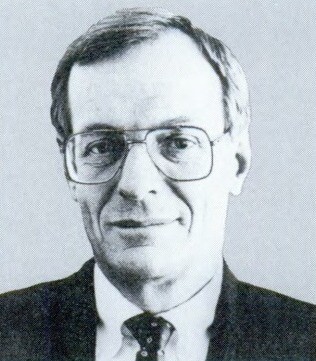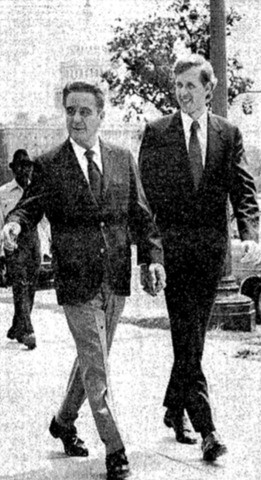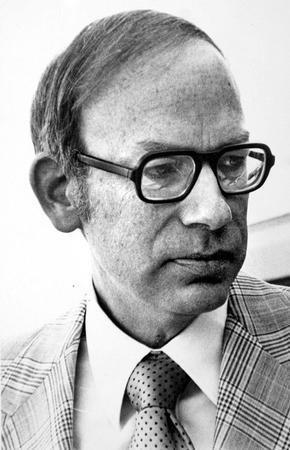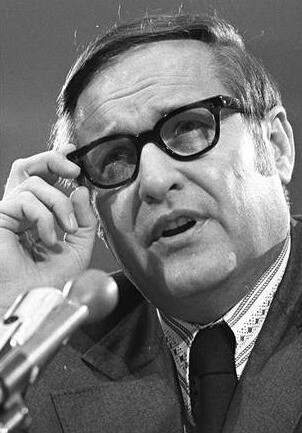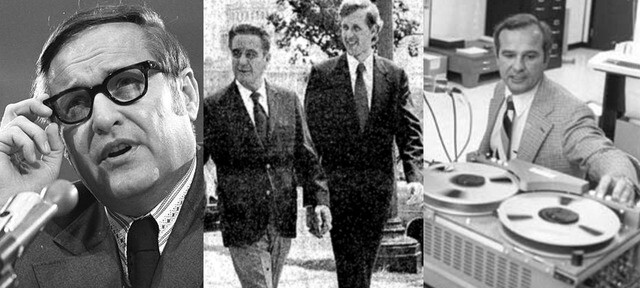From an apostle to senators to famous inventors, several Latter-day Saints played an important part in Watergate as they helped expose the truth about one of America's worst political scandals.
On January 14, 2019, Elder Christofferson will join Pulitzer Prize-winning journalist Bob Woodward in an unprecedented event as they speak about what they have learned about integrity and trust in public life from Watergate and beyond. In honor of this Deseret News event, we wanted to share some Latter-day Saint connections to Watergate.
When people think of major political scandals that reach the highest levels of government in the United States, Latter-day Saint apostles don't often come to mind. But during the Watergate scandal in the 1970s, Elder D. Todd Christofferson played a key role in the trial that ultimately led to the end of a presidency.
When men were caught breaking into the Democratic National Committee headquarters in the Watergate office complex on June 17, 1972, the burglars' trials revealed a series of questionable connections and scandals that connected back to the president of the United States, Richard Milhous Nixon. Among these were tapes recorded in the White House, infamously dubbed the Nixon tapes, that Judge John Sirica ordered Nixon to hand over on Aug 29, 1973. From these tapes, Judge Sirica and his law clerk, D. Todd Christofferson, learned that the political corruption inherent in this case reached far and wide within the White House.
Elder Christofferson wasn't the only Latter-day Saint who helped in the trial, however. From reporters to senators to famous inventors, several Latter-day Saints played an important part in Watergate as they helped expose the truth to the American people.
Jack Anderson
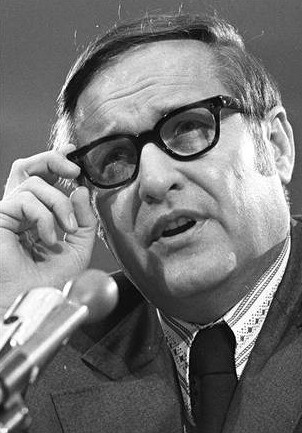
A Pulitzer Prize-winning journalist, Jack Anderson got his start in journalism at 12 years old, writing the Boy Scout column for the Deseret News. After serving two years as a missionary in the Southern States Mission, Anderson began pursuing his career as an investigative journalist.
In 1971, the year after the Pentagon Papers were leaked, Anderson ended up on President Richard M. Nixon's enemy list when he made public Nixon's pro-Pakistan slant on the India-Pakistan conflict. In the years following, as the Watergate scandal gradually unraveled, Anderson continued to relentlessly report on corruption at the White House. He even thwarted President Nixon's plans to quiet the scandal by printing transcripts of the Watergate grand jury.
Because of his efforts to expose political secrets, the Watergate tapes reveal that one of President Nixon's aides, Charles Colson, ordered men to do "whatever was necessary" to silence Anderson. On top of trying to smear the journalist's name and reputation, a plot quickly developed to poison the journalist, but the plans were never carried out.
Image from the Associated Press
D. Todd Christofferson
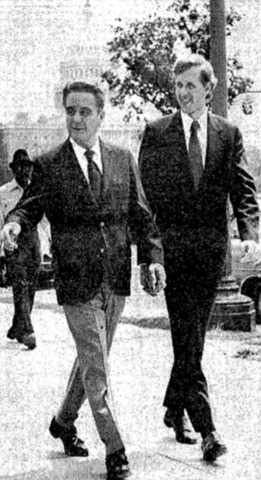
During his final year at law school at Duke University, David Todd Christofferson applied for a prestigious clerkship with Judge John J. Sirica. Despite there being over 200 other applicants, Sirica was impressed by the young Latter-day Saint family man, selecting him for the position.
Little did Christofferson know that his new position would plunge him into the depths of one of the biggest political scandals in American history.
Just two weeks after Christofferson started his post as Sirica's law clerk, the men involved in both break-ins at the Watergate Hotel—the site of Democratic National Party Headquarters—were indicted in Sirica’s court on charges of burglary.
But trials for these men didn't begin until January 1973. Christofferson was with Sirica that March when the first man involved in the scandal finally broke the silence, handing over a letter that changed the scope and implications of the trial.
Later that July, when it was discovered that the White House had a voice-activated recording system and Nixon resisted the court's subpoena for the tapes by citing executive privilege, Sirica finally ruled Nixon must turn over the tapes to the court and asked Christofferson to write up an opinion.
After Nixon appealed the decision to the Supreme Court and lost, he finally turned over the tapes in July 1974.
In December, Sirica finally began reviewing the infamous Nixon tapes accompanied by his law clerk, David Todd Christofferson. Unlike many judges, Sirica trusted Christofferson with a great deal of responsibility, allowing him to talk to politicians and answer questions from the media.
During that hectic time, Sirica told the press that Christofferson was the "only one I could talk to" (“Law Clerk to Watergate Judge Says He Was in Right Place at Right Time”).
In 2015, Elder Christofferson published "Some Lessons from Watergate" that describe the important and even spiritual lessons he learned during this tumultuous time:
"[T]he religious voice remains a critical part of the on-going dialogue that establishes society’s foundational values and obligations. . . . Secular and religious citizens of goodwill must work together to affirm the highest and best principles in their respective worldviews—virtues such as honesty, civility, generosity, respecting the law, and doing to others as you would have them do to you. . . . "You and I know that the purpose of life is not to 'while away' our lives in pursuit of pleasure before we chemically expire. We are God’s great work and glory, and so He has much higher plans for our lives if we are willing."
Image of Judge John J. Sirica and D. Todd Christofferson from The Washington Post August 3, 1974.
Thomas Stockham
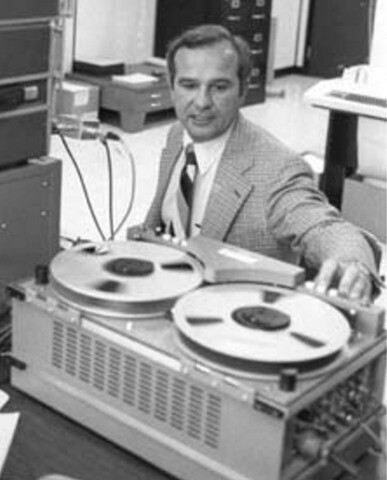
An Emmy, Grammy, and Oscar Award winner, Thomas Stockham earned an Sc.D. from MIT. Because of his pioneering efforts in digital sound, later in life he became known as the "father of digital recording."
► You'll also like: 14 Things You Didn't Know a Latter-day Saint Invented
As a result of his prestige in the recording world, Stockham became one of six experts appointed by Judge Sirica to try and determine what could have caused the erasure of 18 and a half minutes of the Nixon tapes. President Nixon's personal secretary, Rose Mary Wood, claimed the erasure was a mistake.
Dr. Stockham, along with other experts, determined thatthe gap was a result of five individual erasures and rerecordings—something that could not have merely happened by accident.
After Nixon's resignation on August 8, 1974, the prosecutors on the case decided the public had Watergate fatigue and did not pursue the issue, leaving the mystery of the missing material in the tapes unsolved.
Image from Special Collections Dept., J. Willard Marriott Library, University of Utah, retrieved from ethw.org.
Wayne Owens
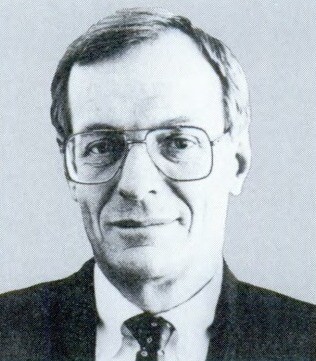
A congressman from Utah, Wayne Owens, played a role in Watergate, making his mark on this event during the fallout that occurred after the Nixon tapes were handed over to the court.
Owens was a member of the Judiciary Committee that voted on the articles of impeachment against Nixon. However, Nixon resigned before the House could consider the impeachment articles.
Owens claims that his involvement with Watergateimpeded his political career in the 1970s, saying his attacks on Nixon upset Utah Republicans who still supported Nixon while Democrats felt he wasn't tough enough on the president. In 1974, Owens lost the seat for Utah's 2nd congressional district to Jake Garn, though he was elected back to the House in 1986.
Image from Wikimedia Commons.
Bob Bennett
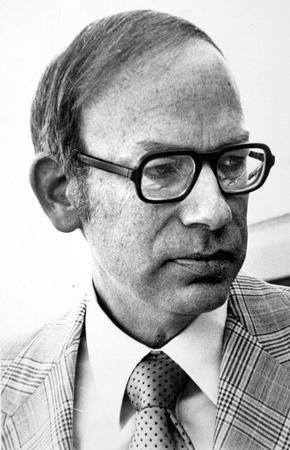
Another Utah Senator, Bob Bennett, has a speculative connection to Watergate. For years following the Watergate scandal, rumors about the mysterious identity of the Washington Post's informant, Deep Throat, circulated throughout the media.
Deep Throat, though a secret source, was known to be high up in the U.S. government and helped reporters Bob Woodward and Carl Bernstein unravel many of the conspiracies surrounding Watergate. For years, rumors circulated that the identity of the mysterious figure was U.S. Senator Bob Bennett.
The reasons for this connection were varied, and, as Bob Bennetttold the Deseret News, "the reason[s] do[n't] seem logical now, but in those paranoid times, it made sense because of ties I had."
For instance, Senator Bennett employed ex-CIA agent Howard Hunt part-time. Hunt simultaneously worked at the White House and was the one in charge of orchestrating the break-in at the Watergate Hotel. Senator Bennett was also a member of the Nixon administration and had a number of contacts at the White House.
In addition, Mullen & Co., a company Bennett purchased, was a front for the CIA, something Bennett says he didn't realize until he discovered contracts the company held with the CIA.
Whatever the rumors, in 2005 Vanity Fair revealed the identity of Deep Throat—and it wasn't Bennett. It was Mark Felt, a former top FBI official. However, Senator Bennett did act as an important source for Bob Woodward, providing information about Howard Hunt and other aspects of the investigation.
Image from Deseret News.

